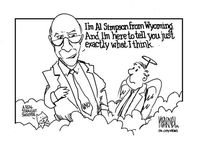Alan K. Simpson, a prominent figure in Wyoming politics and a former U.S. senator, passed away on March 14, 2025, at his ranch near Cody, Wyoming. Simpson's life was celebrated through a series of memorial events planned across Wyoming, culminating in a public celebration of his life at the University of Wyoming’s Arena-Auditorium on March 29, 2025. This venue was chosen specifically to accommodate the many friends and members of the community who wished to commemorate his contributions and legacy.
Simpson, who served as a senator from 1979 to 1997, was known for his bipartisan approach, humor, and strong advocacy for various social issues, including immigration reform and LGBTQ rights. Distinctively, he balanced traditional conservative values with a deep sense of fairness and humanity, making him a unique voice in an increasingly polarized political landscape.
His family described him as a man who “never met a stranger and never forgot a face or a name,” capturing the essence of his personable and approachable nature. As his son Bill Simpson noted, it felt right to celebrate his father’s memory with ample friends and supporters, reflecting the profound impact he made during his lifetime.
One of Simpson's most notable legislative achievements was the Simpson-Mazzoli Act, which addressed illegal immigration by creating a pathway to citizenship for undocumented immigrants already in the country while tightening border security. This landmark legislation showcased his commitment to thoughtful, compassionate governance, focusing on real human challenges rather than mere political posturing.
Simpson was also an outspoken advocate for LGBTQ rights during a time when such views were not widely accepted among Republican lawmakers. Reflecting on the tragic murder of Matthew Shepard in 1998, he called it an “ugly, ugly butchering,” emphasizing that such violent acts did not represent the values of Wyoming. This moment marked a pivotal point in his advocacy for LGBTQ rights, aligning him with the community at a crucial time.
In 2003, he further solidified his stance in support of LGBTQ rights with a public op-ed in the Wall Street Journal, stating, “Homosexuality should be a non-issue for the GOP… sodomy laws are contrary to American values protecting personal liberty and opposing discrimination.” This perspective helped foster a more inclusive political landscape, encouraging open discussions surrounding sexual orientation within Republican circles.
Following his passing, memorial services were organized to honor his legacy. At the Wyoming State Capitol, the public was welcome to pay their respects on March 27 and 28, with Simpson lying in honor prior to his family prayer service. His family expressed gratitude for the overwhelming support and love they received from the Wyoming community. The events included a funeral in Cody on March 31, followed by a public reception at the Center of the West, with many attendees reflecting fondly on his life and work.
The public celebration scheduled at the University of Wyoming represents not just a farewell but also a testament to the indelible mark he left on the state and the people he inspired. Colin Simpson, his son, remarked, “The family is excited to welcome the many friends and community members who wish to commemorate Dad’s life with us.” This sentiment captures not only the essence of the man but also the vast array of relationships he nurtured throughout his lifetime.
In politics, Simpson was known for his ability to collaborate across party lines. His tenure was marked by countless moments of humor and grace, as well as an unwavering commitment to service. As his friend and fellow senator John C. Danforth described, Simpson’s priorities were clear: family first, followed by his obligation to serve the people of Wyoming and the nation.
Simpson's ranch, appropriately named the “Bobcat,” stood as a symbol of his Western heritage, where he often reflected on issues of history and governance. In his time, he was not just a Republican senator; he was a representative who embodied the spirit of humanity, navigating through the politics of his time while holding his values high.
A notable moment during Simpson’s career was his recitation of the Rudyard Kipling poem “If” to Judge Robert Bork during Bork’s Supreme Court nomination hearing in 1987. Simpson hoped to inspire resolve in a challenging moment, illustrating his deep understanding of the pressures within political life. This anecdote encapsulates his character; he had a unique ability to draw from literature and personal experience to illuminate the complexities of governance.
As Wyoming and the nation reflect on his contributions, it is clear that Al Simpson left behind a legacy of integrity, humor, and the understanding that politics should serve humanity rather than divide it. His unwavering spirit and commitment to the shared values of respect and civility resonate deeply in today’s political climate, reminding us of the importance of collaboration and compassion.










